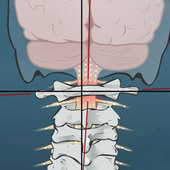 A short time ago, while flying from Amsterdam to Boston, my seatmate was an amiable anesthesiologist from northern Britain on his way to a chronic pain conference. After some enjoyable small talk our conversation turned to pain, an area of mutual professional interest. Unlike many general clinicians, this gentleman and I are both only really one trick ponies. For me, my trick was managing injury to the upper neck and the chronic consequences of untreated injury to that region – often involving significant pain; for him, it was managing pain without an apparent alternative solution.
A short time ago, while flying from Amsterdam to Boston, my seatmate was an amiable anesthesiologist from northern Britain on his way to a chronic pain conference. After some enjoyable small talk our conversation turned to pain, an area of mutual professional interest. Unlike many general clinicians, this gentleman and I are both only really one trick ponies. For me, my trick was managing injury to the upper neck and the chronic consequences of untreated injury to that region – often involving significant pain; for him, it was managing pain without an apparent alternative solution.
When I told him about my preliminary practice based research findings of the lack of relationship between the length of time headache pain has been present and the time required for recovery, his surprise was evident and resulted in an extended conversation about why that relationship might not exist. To people experiencing pain, it is a real thing - however, pain is so multifaceted and personal that the best way to measure it involves asking the patient for their opinion. Pain is a perception, and although it is real you if you have it, chronic pain is not something that seems to submit to the space-time continuum in a manner that most health care practitioners believe.
If you are suffering from persistent pain, my hope for you is that you continue to search for the solution or group of solutions that most effectively help you manage. As you search, remember that if a treatment is addressing the underlying cause of your pain, help might not be that far away.
Written by Dr. Jeff Scholten



